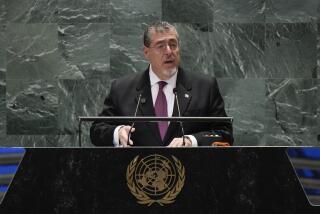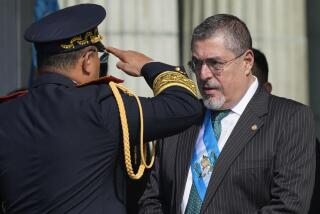Wait-and-See in Guatemala
- Share via
Earlier this month, when Guatemalan President Alfonso Portillo announced he would drastically cut that country’s armed forces, few Guatemalans cheered him. He also announced he would turn certain military installations into school classrooms, and the reaction of the people, even in a nation as desperately short of educational opportunity as Guatemala, was restrained when not openly skeptical. “I’ll believe it when I see it,” said a chief human rights activist.
Guatemalans don’t trust their military, and they won’t trust Portillo until he proves to them he will really change that secretive and feared institution. During Guatemala’s 36-year civil war, which ended in 1996, more than 200,000 people, mostly civilians, died or disappeared. The military slaughtered Maya Indians, who without evidence were considered sympathetic to the rebels. Human rights violations--rapes, illegal detentions, torture--by the army and its paramilitary allies were widespread and did not quite end with the war. Whole villages were burned to the ground.
There is a consensus in Guatemala that radical cuts in the size of the army are necessary, not just because of its history but because the guerrilla wars across Central America have fully ended.
The first task is determining the size of the army, which officials put at 40,000, a disputed figure. By comparison, neighboring Honduras has an army of only 18,000.
Guatemala’s Roman Catholic archdiocese, a chief defender of human rights, called Portillo’s announcement economically sensible and morally necessary, given the terrible record of the armed forces. But it stopped short of outright endorsement, demanding investigation of atrocities during the civil war and prosecution of those responsible for human rights violations. Other organizations took issue with the government’s plan to lay off 6,000 soldiers but no officers. Officers draw the largest salaries, and they are the ones more often accused of human rights violations.
Portillo should make the best of the occasion, throwing some needed light on an institution that has never been accountable to society. He should spell out the army’s true numbers and announce that cuts will affect officers and troops alike. He should also promise further cuts, perhaps following the example of Costa Rica, a sister Central American state, which replaced its army with a smaller and less powerful civil guard in the late 1940s, boosting economic prosperity and confidence in government. Guatemala is desperately short on both. Portillo should heed his skeptical citizens and prove he can carry out his vow.
More to Read
Sign up for Essential California
The most important California stories and recommendations in your inbox every morning.
You may occasionally receive promotional content from the Los Angeles Times.










